
April 5
1908 Birth: Herbert von Karajan, Austrian conductor:
A child prodigy on the piano, he attended Salzburg's Mozarteum. He took his first conducting post in Ulm in 1929. In 1933 he joined the Nazi Party, and under the Third Reich his reputation grew swiftly. After World War II he initially was not allowed to conduct, but in 1947 he began recording with the Vienna Philharmonic, the start of a legacy of some 800 recordings. His U.S. debut in 1955 was attended by controversy over his Nazi-era activities. That same year he became Furtwaengler's successor at the Berlin Philharmonic, and he headed the Salzburg Festival from 1964 until his death [in 1989]
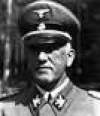
1911 Volkishness: The Hammer group in Magdeburg institutes what is called the Wotan Lodge, with Hermann Pohl elected Master. (THP)
1916 World War I: Gefreiter Adolf Hitler endures trench warfare in Flanders (Artois) with 3 Company, 16 Reserve Infantry Regiment [List Regiment]. [For further details, Click here.]
1917 World War I: Various:
List Regiment: Gefreiter Adolf Hitler's 16 Reserve Infantry Regiment, 3 Company, fortify trenches near Arras. [For further details, Click here.]
Communists: Two telegrams reach the office of British Foreign Secretary Arthur Balfour. One from Berne informs Balfour that Lenin and his group of Russian Communists are negotiating with the Germans for safe passage through Germany. The other, from Lord Halifax, informs him that Trotsky and five of his associates have been seized in Nova Scotia, and that Trotsky is now "the leader of a movement to start a revolution against the present Russian Government, the funds being subscribed by socialists and Germans." (THP)
1918 World War I: Various:
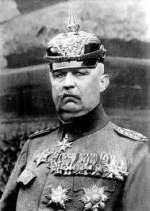
First stage of German spring offensive ends: General Erich Ludendorff formally ends "Operation Michael," the first stage of the final major German offensive of World War I.
Operation Michael, which marked the first sizeable German offensive against Allied positions on the Western Front in more than a year, began on March 21, 1918, with a five-hour-long bombardment of Allied positions near the Somme River from more than 9,000 pieces of German artillery, in the face of which the poorly prepared British 5th Army was rapidly overwhelmed and forced into retreat. For a week, the Germans pushed toward Paris, shelling the city from a distance of 80 miles with their "Big Bertha" cannons; by March 25, they had crossed the Somme and broken through the Allied lines. Hampered by a lack of supplies and cavalry, as well as hardening Allied defenses, German troops became exhausted, and by the end of March the Allies had halted their advance. On April 2, U.S. General John J. Pershing sent several thousand fresh American troops down into the trenches to fight alongside the British and French. It was the first major deployment of U.S. troops in World War I.
By April 5, when Ludendorff shut down the attacks, Operation Michael had produced the biggest gains of territory on the Western Front by either side since 1914. The Germans had advanced almost 40 miles, inflicted some 200,000 casualties and captured 70,000 prisoners and more than 1,000 Allied guns. The costs of battle were high, however: Germans suffered nearly as many casualties as their enemies and lacked the fresh reserves and supplies the Allies enjoyed following the American entrance into the war. Still, Ludendorff would launch four more similar operations that spring of 1918, as the Germans staked everything on a last, desperate offensive on the Western Front.
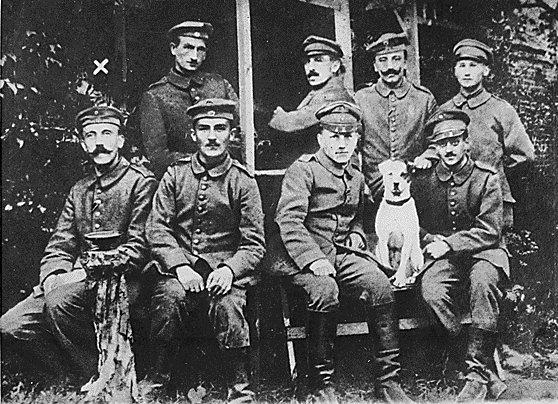
Gefreiter Adolf Hitler's 16th RIR constructs fortified works in difficult defensive positions on an active front with German assault regiments near Fountaine (Montdidier). [For further details, Click here.]
Operation Michael fails—marking the beginning of the end of the First World War. Meanwhile, the arrival in France of large reinforcements from the US give the German's little time to recover from its losses before these reinforcements deploy. Operation Michael has failed to achieve its objectives of separating the Allied Armies.
1919 Antisemitism: Poland: The army executes 35 young Jews.
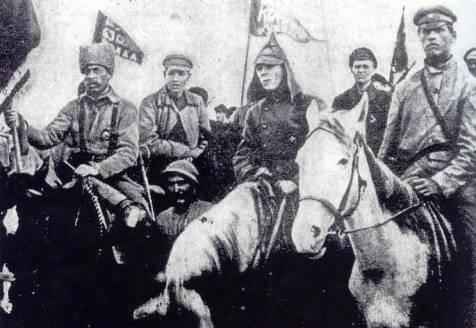
1920 Japanese troops join multi-national forces in Vladivostok: Most of the occupying forces are Japanese, but there are also 7,500 Americans and some British, French, and Italian troops. The Japanese will continue to occupy the region and will eventually install a counterrevolutionary Russian puppet government. (Willett)
From A History of Russia by Nicholas V. Riasanovsky:
The great Civil War in Russia was complicated by Allied intervention, by the war between the Soviet Government and Poland, and by bids for national independence on the part of a number of peoples of the former Romanovs who were not Great Russians. The intervention began in 1918 and involved fourteen countries; the Japanese in particular sent a sizable force into Russia—over 60,000 men. Great Britain dispatched altogether some 40,000 troops, France and Greece two divisions each, and the United States about 10,000 men, while Italy and other countries—except for the peculiar case of the Czechs—sent smaller, and often merely token, forces.
The Allies originally wanted to prevent the Germans from seizing war material in such ports as Archangel and Murmansk, as well as to observe the situation, while the Japanese wanted to exploit the opportunities presented in the Far East by the collapse of Russian power. Japanese troops occupied the Russian part of the island of Sakhalin and much of Siberia east of Lake Baikal. Detachments of American, British, French, and Italian followed the Japanese into Siberia, while other Allied troops landed...in northern European Russia, as well as in southern ports such as Odessa, occupied by the French, and Batum, occupied by the British.
Allied forces assumed a hostile attitude toward the Soviet government, blockaded the Soviet coastline from October 1919 to January 1920, and often helped White movements by providing military supplies—such as some British tanks for Denikin's army—and by the very presence and protection. But they often avoided actual fighting. This fruitless intervention ended in 1920 with the departure of Allied troops, except that the Japanese stayed in the Maritime Provinces of the Russian Far East until 1922 and in the Russian part of Sakhalin until 1925.
1934 Various:
Holocaust: Ludwig Marum: a former Jewish member of the Reichstag, 'commits suicide' while in 'protective custody' of the Gestapo. (THP)
Romania: Forty-six Iron Guard leaders are freed by a military court.
1938 Antisemitism: Poland: Anti-Jewish riots break out in Dabrowa, Poland.
1939 HMS Illustrious is launched, Britain's largest aircraft carrier.
1940 World War II: Norway: Britain and France notify Norway that they reserve the right to deprive Germany of Norway's resources.
1941 Various:
Holocaust: Temporary solution: The newspaper Cologne Zeitung reports:
Although the Lodz ghetto was intended as a mere trial, a mere prelude to the solution of the Jewish question, it has turned out to be the best and most perfect temporary solution of the Jewish problem. (THP)
World War II: Balkans: German commandos secure the docks along the Danube River in preparation for Germany's invasion of the Balkans.
1942 World War II: Various:
Hitler issues a directive for the summer offensive. [See: Was Adolf Hitler a 'Great' Military Leader?]
OSS: Allen W. Dulles joins Col. William (Wild Bill) Donovan's Office of Strategic Services (OSS, 1942-45).
War with Japan: Japanese Navy attacks Colombo in Ceylon (Sri Lanka). Royal Navy Cruisers HMS Cornwall and HMS Dorsetshire are sunk southwest of the island.
1943 Various:

Resistance: Pastor Dietrich Bonhoeffer is arrested and imprisoned by the Gestapo, charged with subverting the German armed forces. (See May 1942) (THP)
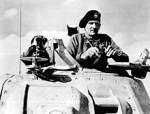
World War II: North Africa: The British 8th Army under Montgomery attacks the next blocking position of the retreating Axis forces at Wadi Akarit.
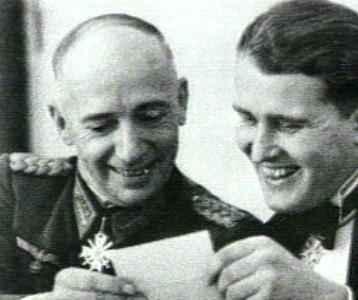
Wunderwaffen: Wernher von Braun submits a formal application to the SS-Rasse-und Siedlungshauptamt (SS Central Office for Race and Settlement) requesting permission to marry a twenty-seven year old Berlin woman, Dorothee Brill. In the event, Brill and von Braun will not marry. Perhaps they found a Jew in her family tree, or the couple merely fell out of love? The reason is unknown. Von Braun will not marry until March 1, 1947. (Piszkiewicz)
[See: Wunderwaffen: Hitler's Deception and the History of Rocketry.]World War II: Poon Lim:
Poon Lim was born in Hainan Island in 1917. 1942, during the World War Two, he was working as a second steward in a British merchant ship SS Ben Lomond in its way from Cape Town to Dutch Guiana. On November 23 1942 a German U-boat intercepted and torpedoed the ship. As the ship was sinking, Poon Lim took a life jacket and jumped overboard before the ship's boilers exploded. After approximately two hours in water he noticed an empty life raft and climbed into it. The raft had couple of tins of biscuits, a ten gallon jug of water, couple of flares and an electric torch. Poon Lim kept himself alive by drinking only few swallows of water and taking two biscuits a day. He kept himself in shape by swimming around the raft twice a day. He took a wire from an electric torch and made it into a fishhook, and used a hemp rope as a fishing line. When he captured a fish, he cut it open with a biscuit tin and used half of it for baits. Later he captured seagulls for food. He used the canvas of the life jacket to collect rainwater. Twice, other vessels passed nearby, first a freighter and then 7 US Navy patrol planes. Neither one noticed him. He also saw another U-boat, who let him be. He counted the days with notches on the side of the raft. On April 5 1943 Poon Lim finally saw a sail on the horizon and managed to attract attention. Three Brazilian fishermen rescued him and took him to Belem three days later. During his ordeal Poon Lim had lost 20 pounds but was able to walk, unaided. He spent two weeks in a Brazilian hospital, and then the British consul arranged him to return to Britain via Miami and New York. He later found out that only 11 others of the all 55 of ship's crew had been rescued. King George VI bestowed a British Empire Medal on him, and [the Royal] Navy used his tale in its manuals of survival techniques. His employers gave him a gold watch. After the war, Poon Lim decided to immigrate to USA but the quota for Chinese was full. However, because of his fame, and the aid of Senator Warren Magnuson, he received a special permission to gain citizenship.
1944 World War II: Greece: 270 inhabitants of Kleisoura are executed by the Germans.
1945 Various: World War II:
FDR to Stalin:

I have received with astonishment your message of April 3 containing an allegation that arrangements which were made between Field-Marshal Alexander and Kesselring at Berne permitted the Anglo-American troops to advance to the east, and the Anglo-Americans promised in return to ease for the Germans the peace terms. In my previous messages to you in regard to the attempts made in Berne to arrange a conference to discuss surrender of the German Army in Italy I have told you that
(i) no negotiations were held in Berne;
(ii) that the meeting had no political implications whatever;
(iii) that in any surrender of the enemy Army in Italy there could be no violation of our agreed policy of unconditional surrender;
(iv) that Soviet officers would be welcomed at any meeting that might be arranged to discuss surrender. For the advantage of our common war effort against Germany, which today gives the promise of an early success in a disintegration of the German armies, I must continue to assume that you have the same high confidence in my truthfulness and reliability that I have always had in yours. I have also a full appreciation of the effect your gallant Army has had in making possible a crossing of the Rhine by the forces under General Eisenhower, and the effect that your forces will have hereafter on the eventual collapse of the German resistance to our combined attacks.
Our advances on the Western Front are due to military action. Their speed has been attributable mainly to the terrific impact of air-power, resulting in destruction of German communications, and to the fact that Eisenhower was able to cripple the bulk of the German forces on the Western Front while they were still west of the Rhine. I am certain that there were no negotiations in Berne at any time, and I feel that your information to that effect must have come from German sources, which have made persistent efforts to create dissention between us in order to escape in some measure responsibility for their war crimes. Frankly, I cannot avoid a feeling of bitter resentment toward your informers, whoever they are, for such vile misrepresentations of my actions or those of my trusted subordinates.
Churchill to FDR:

I am astounded that Stalin should have addressed to you a message so insulting to the honor of the United States and also of Great Britain. His Majesty's Government cordially associate themselves with your reply. There is little doubt in my mind that the Soviet leaders, whoever they may be, are surprised and disconcerted at the rapid advance of the Allied armies in the West and the almost total defeat of the enemy on our front, especially as they say they are themselves in no position to deliver a decisive attack before the middle of May. All this makes it the more important that we should join hands with the Russian armies as far to the east as possible, and, if circumstances allow, enter Berlin. I deem it of the highest importance that a firm and blunt stand should be made at this juncture by our two countries in order that the air may be cleared and they realize that there is a point beyond which we will not tolerate insult. I believe this is the best chance of saving the future. If they are ever convinced that we are afraid of them and can be bullied into submission, then indeed I should despair of our future relations with them and much else.
Kuniaki Koiso resigns as Prime Minister of Japan, and is replaced by Kantaro Suzuki.
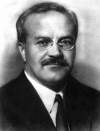
War against Japan: USSR: Molotov tells the Japanese Ambassador in Moscow that the Soviet Union is denouncing its 1941 non-aggression pact with Japan, making it possible for the Soviets to take part in the war against Japan. They will wait until August 8, two days after the US drops the first atomic bomb on Japan, when its surrender seems imminent. (THP)
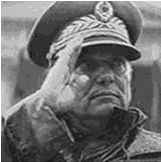
Tito signs "friendship treaty" with Soviet Union: Yugoslav partisan leader Tito signs an agreement permitting "temporary entry of Soviet troops into Yugoslav territory." [For further details, Click here]
1951 Cold War: Rosenbergs sentenced to death for spying:
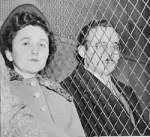
The climax of the most sensational spy trial in American history is reached when a federal judge sentences Julius and Ethel Rosenberg to death for their roles in passing atomic secrets to the Soviets. Although the couple proclaimed their innocence, they died in the electric chair in June 1953. [For further details, Click here]
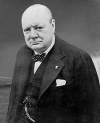
1955 Retirement: Sir Winston Leonard Spencer Churchill: the British leader who guided Great Britain and the Allies through the crisis of World War II, retires as prime minister of Great Britain.
Born at Blenheim Palace in 1874, Churchill joined the British Fourth Hussars upon his father's death in 1895. During the next five years, he enjoyed an illustrious military career, serving in India, the Sudan, and South Africa, and distinguishing himself several times in battle. In 1899, he resigned his commission to concentrate on his literary and political career and in 1900 was elected to Parliament as a Conservative MP from Oldham. In 1904, he joined the Liberals, serving a number of important posts before being appointed Britain's First Lord of the Admiralty in 1911, where he worked to bring the British navy to a readiness for the war he foresaw.
In 1915, in the second year of World War I, Churchill was held responsible for the disastrous Dardanelles and Gallipoli campaigns and was thus excluded from the war coalition government. However, in 1917, he returned to politics as a cabinet member in the Liberal government of Lloyd George. From 1919 to 1921, he was secretary of state for war and in 1924 returned to the Conservative Party, where two years later he played a leading role in the defeat of the General Strike of 1926. Out of office from 1929 to 1939, Churchill issued unheeded warnings of the threat of Nazi and Japanese aggression.
After the outbreak of World War II in Europe, Churchill returned to his post as First Lord of the Admiralty and eight months later replaced Neville Chamberlain as prime minister of a new coalition government. In the first year of his administration, Britain stood alone against Nazi Germany, but Churchill promised his country and the world that Britain would "never surrender." He rallied the British people to a resolute resistance and expertly orchestrated Franklin D. Roosevelt and Joseph Stalin into an alliance that eventually crushed the Axis.
After a postwar Labor Party victory in 1945, he became leader of the opposition and in 1951 was again elected prime minister. In 1953, he was knighted by Queen Elizabeth II and awarded the Nobel Prize in literature. After his retirement as prime minister, he remained in Parliament until 1964, the year before his death. (History.com)
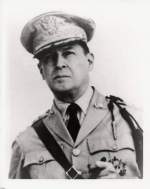
1964 Death: American General Douglas MacArthur: He was poised to command the invasion of Japan in November 1945 but was instead instructed to accept their surrender on September 2, 1945. MacArthur oversaw the occupation of Japan from 1945 to 1951 and is credited for making far-ranging democratic changes in that country. He led United Nations forces defending South Korea in 1950-51 against North Korea's invasion. MacArthur was relieved of command by President Harry S Truman in April 1951 for insubordination and failure to follow Presidential directives. [For further details, Click here]
1969 Death: Ain-Ervin Mere a leading Estonian collaborator with Nazi Germany. An Obersturmbannfuehrer in the SS, he was also the head of the Sicherheitspolizei in Estonia (Estonian Security Police) following its creation in 1942.
1975 Death: Chiang Kai-shek: First and fifth President of the Republic of China:
Chiang Kai-shek, the son of a wine merchant, was born in Fenghua, China, on 31st October 1887. His father died when he was a child leaving the family in extreme poverty. [Chiang] was sent to live with relatives but he ran away and joined the provincial army.
Chiang was a good soldier and he was eventually sent to the military academy in Paoting. In 1907 he attended the Military State College in Tokyo. During this period he became a supporter of Sun Yat-sen, the leader of the Kuomintang (Nationalist Party). During the 1911 revolution Chiang led a regiment that captured Shanghai. After the counter-revolution that followed, Chiang returned to Japan.
With the help of advisers from the Soviet Union the Kuomintang gradually increased its power in China. In 1924 Chiang became head of the Whampoa Military Academy. Sun Yat-sen died on 12th March 1925. After a struggle with Wang Ching-Wei, Chiang eventually emerged as the leader of the Kuomintang. He now carried out a purge that eliminated the communists from the organization.
In 1926 Chiang commanded the army which aimed to unify China. He defeated the communist army and forced the survivors to make the famous Long March to Shensi in North West China. Chiang eventually established a government in Nanjing. Major financial reforms were carried out and the education system and the road transport were both improved. Chiang also established the New Life Movement in 1934 which reasserted traditional Confucian values to combat communist ideas.
When the Japanese Army invaded the heartland of China in 1937, Chiang was forced to move his capital from Nanking to Chungking. He lost control of the coastal regions and most of the major cities to Japan. In an effort to beat the Japanese he agreed to collaborate with Mao Zedong and his communist army.
After the bombing of Pearl Harbor, Chiang and his government received considerable financial support from the United States. General Joseph Stilwell, head of American Army Forces in China, Burma and India (CBI), disagreed with this policy, arguing that Chiang was an inept leader and was ignorant of the fundamentals of modern warfare. Stilwell was accused of being pro-communist and in October 1944 Stilwell was recalled to the United States and was replaced by General Albert Wedemeyer.
During the Second World War the communist guerrilla forces were well led by Zhu De and Lin Biao. As soon as the Japanese surrendered, Communist forces began a war against the Nationalists. The communists gradually gained control of the country and on 1st October, 1949, Mao Zedong announced the establishment of People's Republic of China.
Chiang and the remnants of his armed forces fled to Formosa (Taiwan). His autobiography, Summing up at Seventy, was published in 1957.
1976 Death: Howard Robard Hughes: one of the richest men to emerge from the American West during the 20th century, dies while flying from Acapulco to Houston.
Born in Houston, Texas, in 1905, Hughes inherited an estate of nearly a million dollars when his father died in 1923. Hughes' father also left him the business that had created this fortune, the Hughes Tool Company, which controlled the rights to a new oil drill technology that was in high demand. The young Hughes quickly began to expand his business empire into new fields. In 1926, he moved to Hollywood, where he became involved in the rapidly growing movie industry. He produced several popular films, including Hell's Angels, Scarface, and The Outlaw.
Fascinated with the new technology of airplanes, Hughes also invested heavily in the burgeoning West Coast aviation industry. With some training in engineering from the California Institute of Technology and the Rice Institute of Technology, Hughes designed his own aircraft and then had his Hughes Aircraft Company build it. In 1935, he piloted one of his airplanes to a new world-speed record of 352.46 mph. His reputation as an aircraft designer and builder suffered after an ill-fated WWII government-sponsored project to build an immense plane that Hughes claimed would be able to transport 750 passengers. Nicknamed the "Spruce Goose", Hughes' monstrosity flew only once: a one-mile hop on November 2, 1947. [For further details, Click here]
1984 Death: Arthur Travors Harris: Marshal of the RAF:
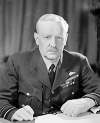
Known universally by his nickname 'Bomber', Sir Arthur Harris was the architect of Britain's strategic air offensive in the Second World War and for three years pursued the systematic destruction of Germany with a single-minded determination. Of all the Allied wartime commanders, Harris is arguably the most controversial and to this day his name is closely linked with the questionable policy of area bombing. Although he did not invent area bombing, he applied himself rigorously to its execution and demonstrated to the world the importance of strategic air power and the key role played by the RAF in the Allied war effort. Harris was a man who could express himself clearly and who exuded a clear sense of purpose, although he was seen by some as unrefined and rude, lacking in sensitivity, impatient and totally inflexible. Yet generally he was regarded with affection by his bomber crews, and with awe by his many minions at Bomber Command headquarters. When he was appointed Commander-in-Chief of Bomber Command in 1942, the bomber war had scarcely begun. In the thirty months that preceded his arrival at High Wycombe, Bomber Command had dropped about 90,000 tons of bombs and lost some 7,000 aircrew killed on operations; during the period of his command from 1942 to 1945, over 850,000 tons of bombs were dropped but aircrew casualties climbed to more than 40,000. Although promoted Marshal of the RAF in 1945, unlike the other main leaders of the war years Harris did not receive a peerage in the 1946 New Year honours. Politicians, including Churchill himself, were quick to distance themselves from the bomber offensive now that the war had been won, and Sir Arthur Harris and Bomber Command became victims of post-war political expediency.
2004 Death: Slawomir Rawicz: a Polish soldier who was arrested by Soviet occupation troops after the German-Soviet invasion of Poland. In a book he participated in writing, he claimed that he and six others escaped and walked over 6500 km (4000 miles) south, through the Gobi desert, and over the Himalayas to India. In 2006, records from the former Soviet union including some written by Rawicz himself were discovered that show that Rawicz was pardoned as a part of a general release of Poles from the Soviet Union in 1942 and was afterward transported across the Caspian Sea to a refugee camp in Iran. The story of his escaping to India is chronicled in a ghost-written book The Long Walk, whose veracity has always been considered controversial.
Edited by Levi Bookin (Copy editor)
levi.bookin@gmail.com
Disclaimer: This site includes diverse and controversial materials--such as excerpts from the writings of racists and anti-Semites--so that its readers can learn the nature and extent of hate and anti-Semitic discourse. It is our sincere belief that only the informed citizen can prevail over the ignorance of Racialist "thought." Far from approving these writings, this site condemns racism in all of its forms and manifestations.
Fair Use Notice: This site may contain copyrighted material the use of which has not always been specifically authorized by the copyright owner. We are making such material available in our efforts to advance understanding of historical, political, human rights, economic, democracy, scientific, environmental, and social justice issues, etc. We believe this constitutes a "fair use" of any such copyrighted material as provided for in section 107 of the US Copyright Law. In accordance with Title 17 U.S.C. Section 107, the material on this site is distributed without profit to those who have expressed a prior interest in receiving the included information for research and educational purposes. If you wish to use copyrighted material from this site for purposes of your own that go beyond 'fair use', you must obtain permission from the copyright owner.
Please Note: The list-owner and the moderator of 3rdReichStudies are not responsible for, and do not necessarily approve of, the random ads placed on our pages by our web server. They are the unfortunate price one pays for a 'free' website.